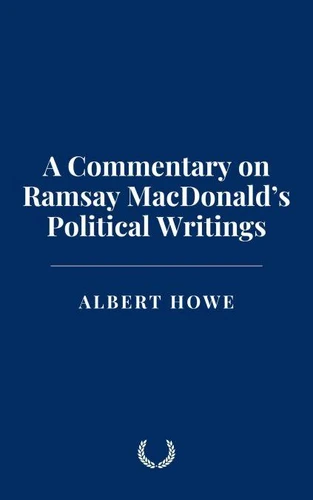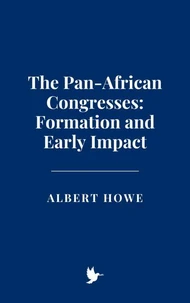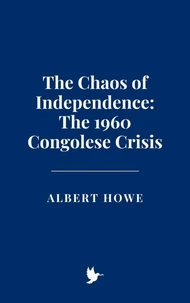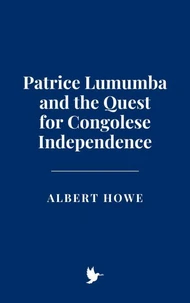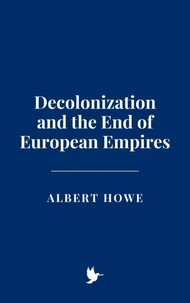A Commentary on Ramsay MacDonald’s Political Writings
Par :Formats :
Disponible dans votre compte client Decitre ou Furet du Nord dès validation de votre commande. Le format ePub est :
- Compatible avec une lecture sur My Vivlio (smartphone, tablette, ordinateur)
- Compatible avec une lecture sur liseuses Vivlio
- Pour les liseuses autres que Vivlio, vous devez utiliser le logiciel Adobe Digital Edition. Non compatible avec la lecture sur les liseuses Kindle, Remarkable et Sony
 , qui est-ce ?
, qui est-ce ?Notre partenaire de plateforme de lecture numérique où vous retrouverez l'ensemble de vos ebooks gratuitement
Pour en savoir plus sur nos ebooks, consultez notre aide en ligne ici
- FormatePub
- ISBN8227065759
- EAN9798227065759
- Date de parution22/01/2025
- Protection num.pas de protection
- Infos supplémentairesepub
- ÉditeurBig Dog Books, LLC
Résumé
This book offers an in-depth analysis of Ramsay MacDonald's political writings, focusing on his contributions to British socialism, his leadership of the Labour Party, and his lasting impact on social democratic thought. Through a series of twenty chapters, the book explores MacDonald's early life, intellectual influences, and the ideological framework that shaped his political career. It delves into his commitment to gradual, democratic socialism, emphasizing his belief in state intervention to promote social justice, his critique of imperialism, and his moral vision for a fairer society.
The book also examines MacDonald's complex relationship with the Labour Party, his leadership during critical moments, such as the formation of the National Government in 1931, and the tensions between idealism and political pragmatism that defined his career. The text highlights MacDonald's advocacy for diplomacy and international cooperation, his support for social welfare reforms, and his belief in the moral responsibility of the state to care for the most vulnerable.
Throughout, the book assesses how MacDonald's writings offer important lessons for contemporary political thought, particularly in the context of global challenges like economic inequality, climate change, and international conflict. The analysis draws on primary sources, including MacDonald's speeches, writings, and correspondence, to provide a nuanced view of his intellectual contributions, political decisions, and the legacy he left behind in shaping the future of social democracy.
Ultimately, this book reassesses MacDonald's place in history, acknowledging both his achievements and the controversies surrounding his career, while emphasizing his enduring influence on progressive political movements today.
The book also examines MacDonald's complex relationship with the Labour Party, his leadership during critical moments, such as the formation of the National Government in 1931, and the tensions between idealism and political pragmatism that defined his career. The text highlights MacDonald's advocacy for diplomacy and international cooperation, his support for social welfare reforms, and his belief in the moral responsibility of the state to care for the most vulnerable.
Throughout, the book assesses how MacDonald's writings offer important lessons for contemporary political thought, particularly in the context of global challenges like economic inequality, climate change, and international conflict. The analysis draws on primary sources, including MacDonald's speeches, writings, and correspondence, to provide a nuanced view of his intellectual contributions, political decisions, and the legacy he left behind in shaping the future of social democracy.
Ultimately, this book reassesses MacDonald's place in history, acknowledging both his achievements and the controversies surrounding his career, while emphasizing his enduring influence on progressive political movements today.
This book offers an in-depth analysis of Ramsay MacDonald's political writings, focusing on his contributions to British socialism, his leadership of the Labour Party, and his lasting impact on social democratic thought. Through a series of twenty chapters, the book explores MacDonald's early life, intellectual influences, and the ideological framework that shaped his political career. It delves into his commitment to gradual, democratic socialism, emphasizing his belief in state intervention to promote social justice, his critique of imperialism, and his moral vision for a fairer society.
The book also examines MacDonald's complex relationship with the Labour Party, his leadership during critical moments, such as the formation of the National Government in 1931, and the tensions between idealism and political pragmatism that defined his career. The text highlights MacDonald's advocacy for diplomacy and international cooperation, his support for social welfare reforms, and his belief in the moral responsibility of the state to care for the most vulnerable.
Throughout, the book assesses how MacDonald's writings offer important lessons for contemporary political thought, particularly in the context of global challenges like economic inequality, climate change, and international conflict. The analysis draws on primary sources, including MacDonald's speeches, writings, and correspondence, to provide a nuanced view of his intellectual contributions, political decisions, and the legacy he left behind in shaping the future of social democracy.
Ultimately, this book reassesses MacDonald's place in history, acknowledging both his achievements and the controversies surrounding his career, while emphasizing his enduring influence on progressive political movements today.
The book also examines MacDonald's complex relationship with the Labour Party, his leadership during critical moments, such as the formation of the National Government in 1931, and the tensions between idealism and political pragmatism that defined his career. The text highlights MacDonald's advocacy for diplomacy and international cooperation, his support for social welfare reforms, and his belief in the moral responsibility of the state to care for the most vulnerable.
Throughout, the book assesses how MacDonald's writings offer important lessons for contemporary political thought, particularly in the context of global challenges like economic inequality, climate change, and international conflict. The analysis draws on primary sources, including MacDonald's speeches, writings, and correspondence, to provide a nuanced view of his intellectual contributions, political decisions, and the legacy he left behind in shaping the future of social democracy.
Ultimately, this book reassesses MacDonald's place in history, acknowledging both his achievements and the controversies surrounding his career, while emphasizing his enduring influence on progressive political movements today.

